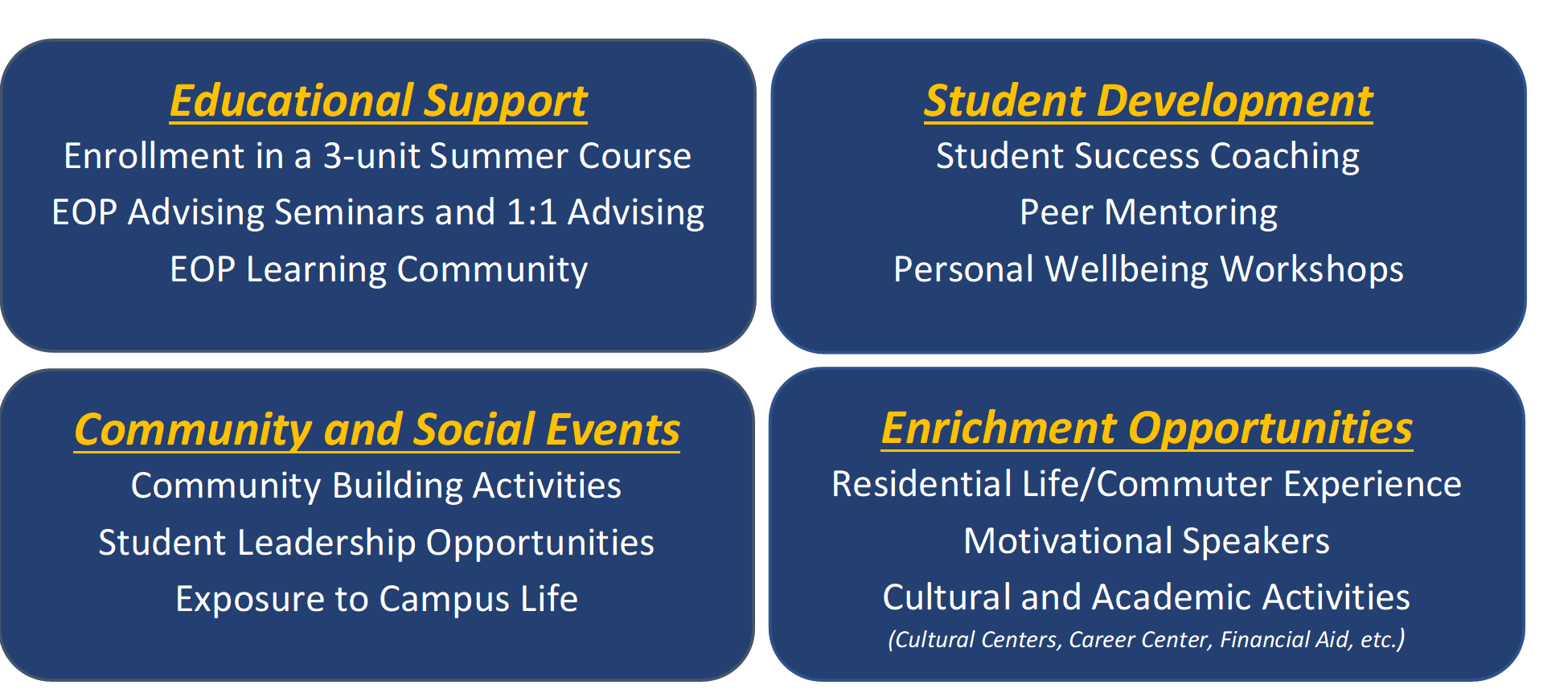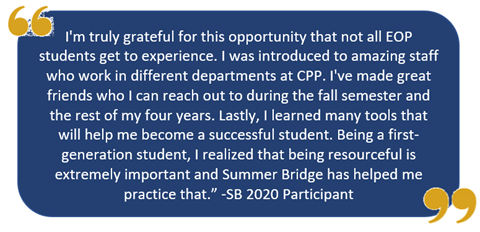
Educational Opportunity Program, Summer Bridge: A First Year Summer Transition Program
Student Success Orientation, Transition and Retention Graduate Mid-Level New Professional Senior Level
March 16, 2021
The transition to college can be intimidating, especially for first-generation college students. The imposter syndrome can often creep in, along with feelings of self-doubt, loneliness, and anguish on how to pay for college or whether they belong. Students may think they are alone in these feelings but programs such as the Educational Opportunity Program (EOP) and Summer Bridge (SB) are here to support students through their transition and educational journey at Cal Poly Pomona (CPP).
EOP students have many intersecting identities such as: being historically low-income, first-generation, and underrepresented, yet they are stronger than they know. They are resilient with a strong desire to become the first in their families to pursue higher education. Building on an asset-based framework, SB was established in 1985 to assist incoming first year EOP students with the transition from high school to the university setting. Over the past 36 years, SB continues to evolve and assist students in addressing their unique needs by providing holistic support services that not only impacts their lives but their families as well.
Program Model
Summer Bridge (SB) is a free comprehensive, five-week summer transition program where incoming first year EOP students are invited to participate to connect, learn, and grow with their EOP community. Participants get a head start in their college journey, build a support system, and gain essential skills that facilitate their transition and success at CPP. In this intensive program participants are exposed to four main core elements:

Historically, participants were required to live on campus for the first three weeks and commute for the last two weeks, exposing them to both the residential and commuter lifestyle. Due to the impact of the COVID-19 Pandemic and transition to remote learning, in 2020 the SB program was modified to be facilitated in a virtual modality. The changes included an online course, a laptop loaner program, a new daily time structure (4-5 hours), and virtual engagement activities that maintained the core program elements, without the on-campus living or commuter experience.
Both in-person and virtually, throughout the five-week program, students are exposed to in-depth topics that equip them with knowledge and a support system to confidently begin their collegiate journey. Participants are also enrolled in a three-unit summer course, Introduction to Ethnic Studies, where they are exposed to fundamental theories of race relations, college level rigor, and opportunities to build intentional faculty mentorships. Additionally, EOP Learning Strategists are embedded in class to create a learning community focused on increasing students’ academic self-efficacy.
Students are provided holistic support through advising seminar, led by EOP Advisors. EOP Advisors assist students with navigating university academic policies and procedures and serve as success coaches that support their journey through graduation. Upper-division student leaders play a crucial role in SB. Student leaders serve as Peer Mentors or Residential Advisors (RA). Peer Mentors serve as positive role models by sharing their experiences and helping students develop their identities in a one-to-one setting. RA’s, during the in-person program, provide an inclusive living environment while building community, upholding the student code of conduct, and assisting students in navigating residential life.

Learning Outcomes
SB participants will be able to:
- gain an understanding and increased self-awareness related to their first-generation EOP identity and their intersecting identities
- articulate the importance of planning in all aspects of their college career
- understand academic policies and degree requirements
- identify key resources available to them for their transition and success
- describe key expectations of them as college students
- establish and understand the value of social support networks with SB peers, staff, and faculty
- develop a sense of belonging to the university and EOP
Program Impact
Over the last decade, SB has celebrated the following successes:
- 1,057 EOP students served, with 60–140 students per cohort
- 92% average first year retention rate (fall to fall)
- 100% Ethnic Studies course pass rate, with an average grade of B or higher
In 2020, we provided an enriching and meaningful experience to 80 participants. Below are outcomes based on the SB student survey:
- 98% of respondents felt a stronger sense of belonging to the CPP community
- 91% of respondents felt confident in their ability to be successful college students
- 100% of participants retained from summer to fall term

Implications for Further Practice
As we continue to grow and develop the program to fit the ever-changing needs of EOP students, we have learned many valuable lessons such as:
- Financial Constraints: To help students understand how to financially cover the cost of college, the program collaborates with the Office of Financial Aid and Scholarships to provide students with workshops on "Understanding My Financial Aid", and "Money Management".
- Wellness: Over the years, students have expressed interest in developing effective wellbeing skills and resources. Thus, we embedded wellness workshops in collaboration with many campus partners (i.e., Basic Needs, and Counseling & Psychological Services).
- Online Learning & Engagement: Summer 2020 introduced many new challenges. Students were faced with learning from home, technology needs, managing various household distractions and responsibilities impacting their focus and level of engagement. To assist, the team intentionally scheduled weekly peer mentoring meetings to check in on their transition, provide strategies for success, and referrals and support.
In conclusion, to effectively support first-generation college students and their unique needs, institutions must consider their multiple intersecting identities into a program’s service model and practices. It is also critical to note that SB is just a piece of the continuum of services that collectively is offered within EOP to support a student's educational success.
SB has been and continues to provide a supportive and holistic experience that positively impacts students’ confidence and sense of belonging through the strong collaboration between the program and multiple campus partners. We can't do it alone!
_________________
Cristina A. Rodriguez currently serves as the Coordinator of EOP Transition Programs for Student Support and Equity Programs at Cal Poly Pomona. She leads the planning, coordination, and facilitation of the Summer Bridge and Transfer Bridge program for incoming first year and transferring EOP students. Cristina holds a Bachelor of Arts degree in Sociology from California State University, San Bernardino and a Master of Science degree in College Student Personnel Services and Administration from the University of Central Arkansas.
Christina Jacobo currently serves as the EOP Transition Programs Specialist for Student Support and Equity Programs at Cal Poly Pomona. Within this role, she assists in the planning and coordination of Summer Bridge and Transfer Bridge, as well as leads the Summer Transition Programs Champion student leaders. Christina holds a Bachelor of Arts degree in Psychology, with a minor in Ethnic Studies from UC San Diego and a Master of Science degree in Higher Education from Cal State Fullerton.
Contact Information:
Email: [email protected]